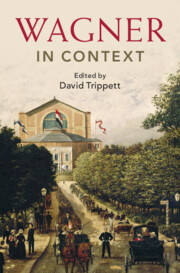Book contents
- Wagner in Context
- Composers in Context
- Wagner in Context
- Copyright page
- Contents
- Illustrations
- Musical Examples
- Contributors
- Acknowledgements
- Abbreviations
- Introduction
- I Place
- II People
- III Politics, Ideas, and Bodies
- IV Life, Language, and the Ancient World
- V Music and Performance
- VI Reception
- Chapter 35 Regietheater in Performance
- Chapter 36 Twentieth-Century Reception and Anti-Semitism
- Chapter 37 Bayreuth as Idea: Chamberlain, Wolzogen, Hitler
- Chapter 38 Performing Wagner in Israel: An Affront or a Tribute?
- Chapter 39 Nineteenth-Century Music Criticism
- Chapter 40 Wotan’s Stormtroopers and the Total Art Machine: Kittler’s Ring of the Nibelung
- Chapter 41 Sound Recording
- Chapter 42 The Wagnerian Erotics of Video Game Music
- Further Reading
- Select Bibliography
- Index
Chapter 40 - Wotan’s Stormtroopers and the Total Art Machine: Kittler’s Ring of the Nibelung
from VI - Reception
Published online by Cambridge University Press: 14 March 2024
- Wagner in Context
- Composers in Context
- Wagner in Context
- Copyright page
- Contents
- Illustrations
- Musical Examples
- Contributors
- Acknowledgements
- Abbreviations
- Introduction
- I Place
- II People
- III Politics, Ideas, and Bodies
- IV Life, Language, and the Ancient World
- V Music and Performance
- VI Reception
- Chapter 35 Regietheater in Performance
- Chapter 36 Twentieth-Century Reception and Anti-Semitism
- Chapter 37 Bayreuth as Idea: Chamberlain, Wolzogen, Hitler
- Chapter 38 Performing Wagner in Israel: An Affront or a Tribute?
- Chapter 39 Nineteenth-Century Music Criticism
- Chapter 40 Wotan’s Stormtroopers and the Total Art Machine: Kittler’s Ring of the Nibelung
- Chapter 41 Sound Recording
- Chapter 42 The Wagnerian Erotics of Video Game Music
- Further Reading
- Select Bibliography
- Index
Summary
The chapter focuses on two key aspects of Friedrich Kittler’s analysis of Richard Wagner’s Ring of the Nibelung. First, drawing on Kittler’s account of changing ‘discourse networks’, the cycle is seen (and heard) as a highly media-conscious total work of art that rises from noise into meaning and ultimately returns back to noise. Music and words are able to create and transmit messages by analysing their own technical properties. The second aspect is the modernisation of war. With the help of his Valkyrie daughters, Wagner’s Wotan turns into a modern warlord who no longer bullies unwilling conscripts or mercenaries but instead mobilises the affect of modern soldier-subjects Wagner’s Siegfried, in turn, embodies military reforms that go by the name of mission tactics. He is the human equivalent of a fully autonomous drone: the new and independently operating soldier or partisan programmed from above to think on his own.
- Type
- Chapter
- Information
- Wagner in Context , pp. 399 - 411Publisher: Cambridge University PressPrint publication year: 2024
- 1
- Cited by

